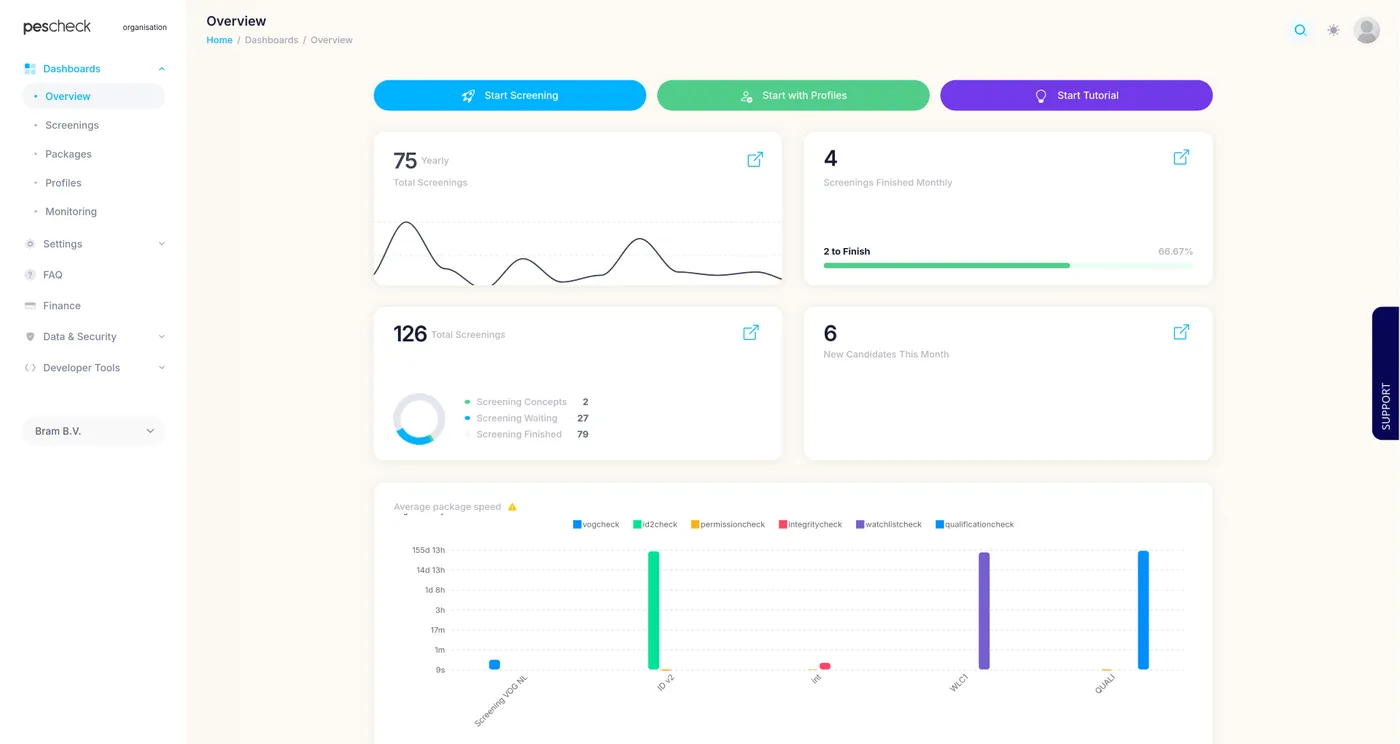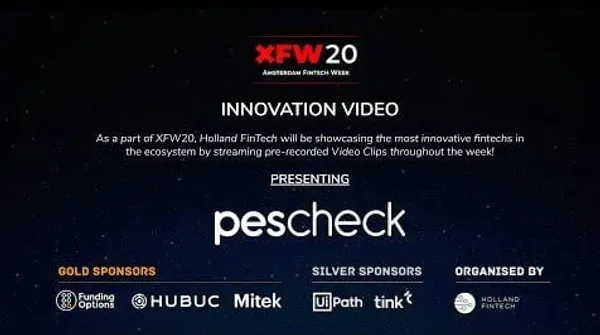A European HR Guide for 2025
Recruiting should feel exciting, but reality is messier. A 2023 applicant survey found that 70% of workers lie on their CVs and over 80% lie during job interviews. In today’s hiring climate, trusting a CV at face value is simply too risky.
A well-run background check helps uncover inaccuracies, reassure stakeholders, and protect your organisation’s reputation. This guide breaks down what a background check includes in Europe, how GDPR and Dutch rules shape the process, the red flags to watch for, and how modern providers like Pescheck keep screening fast and compliant.
Why Background Checks Matter
Even one bad hire affects productivity, morale, compliance, and reputation.
Slow or poorly organised checks make it worse:
- Delayed onboarding
- Higher candidate drop-off
- Administrative overhead
- Extended vacancy periods
Modern screening tech can cut turnaround times from 5 to 7 days to 1 to 3 days, protecting both the hiring journey and your competitive edge.
Background checks also reduce risks linked to:
- falsified CVs
- criminal activity
- licensing issues
- unsafe driving
- sanctions risks
- fraudulent employment or education claims
Fast, accurate screening helps HR teams make informed, fair decisions, and avoids costly mistakes.
What a Background Check Typically Includes
Scope varies by role and jurisdiction, but most European background checks cover the following:
Core Checks (Europe-wide)
| Check | What It Verifies |
|---|---|
| Identity & Right-to-Work | Passport/ID validity, address history, and legal work eligibility. |
| Criminal-Record Certificate (e.g., Dutch VOG) | Confirms the absence of relevant criminal convictions. |
| Employment History | Job titles, dates, responsibilities, reasons for leaving. |
| Education & Professional Qualifications | Degrees, certifications, licenses. |
| References | Performance insights and role confirmation. |
| Sanctions & Watchlists | Public sanctions, regulatory lists, fraud registries. |
Role-Specific Checks
- Credit Check: Only for high-trust roles; heavily restricted by EU member-state law.
- Driving Record: For logistics or transport roles.
- Security Clearance: For government or sensitive corporate roles.
- Health Assessment: Only when legally required (e.g., safety-critical roles).
Special Note for the Netherlands: VOG
In the Netherlands, employers commonly require a VOG (Verklaring Omtrent het Gedrag), a certificate confirming no relevant criminal record.
Required for roles in:
- childcare
- education
- transport
- finance
- airport access
- security-sensitive sectors
Legal Framework: GDPR and Dutch Rules
Background checks involve processing personal data, which means the GDPR and local laws apply.
Key GDPR Principles for Screening
Legitimate Interest & Necessity
Screening must be essential for the role, not “nice to have”.Data Minimisation
Only collect information strictly needed for the job.Transparency
Candidates must be informed about:
- what is checked
- why
- how long data is stored
- their rights
Security & Data Protection
Sensitive data must be encrypted, access controlled, and securely stored.Restriction on Criminal Data
In the Netherlands, criminal-record data may only be processed by:
- licensed screening companies, or
- via the candidate’s own VOG certificate
Employers cannot access police databases directly.
- Consent ≠ Valid Legal Basis
Because of the power imbalance, consent is not considered freely given.
Employers should rely on legitimate interest or legal obligation instead.
Red Flags, and How to Evaluate Them Fairly
Not all issues are automatic deal-breakers. HR should interpret findings in context.
Common red flags:
- Criminal convictions or pending cases, relevance matters.
- Driving violations, only relevant for driving roles.
- Unverified employment history, missing dates, inflated roles.
- Unverified education, fake degrees or misinformation.
- Gaps in employment, require clarification, not assumptions.
- Illegal or excessive data collection, itself a compliance red flag.
Fair hiring principles require evaluating:
- age of the incident
- relevance to the role
- rehabilitation
- mitigating circumstances
The Dutch VOG system already filters out irrelevant convictions, so a missing VOG is often more meaningful than the presence of a minor record.
Running Background Checks Effectively
1. Define the Screening Scope
Start by mapping job risks and only include checks that are justified and lawful.
2. Use Trusted, GDPR-Compliant Providers
Look for providers that:
- automate identity verification
- integrate with ATS/HRS systems
- are licensed for criminal-record processing
- minimise manual errors
- reduce turnaround times
3. Communicate Clearly With Candidates
Provide a privacy notice that explains:
- what you collect
- why
- how long you store it
- how candidates can exercise their rights
4. Limit Retention
Delete data once the hiring decision is made, GDPR requires strict retention limits.
5. Evaluate Results Fairly & Document Your Reasoning
Keep notes if a finding contributes to a hiring decision, this protects you legally.
How Pescheck Helps European Employers
Pescheck streamlines screening for HR teams by combining speed, compliance, and automation:
- Automated identity verification
- Digital VOG request flows
- Fast education & employment verification
- ATS integrations (including Personio, AFAS, Visma | Raet, HoorayHR and more)
- GDPR-first data handling
- Dedicated compliance support
By reducing checks from days to hours, Pescheck helps hiring teams move faster, without compromising accuracy or privacy. Even if your company is active in multiple countries and looking to verify employees who will be working in multiple countries our international background screening will be able to help you.
We don’t collect unnecessary data, don’t run medical checks unless legally required, and never store information longer than needed.
Conclusion
In 2025, verifying candidate information is no longer optional. With 70% of applicants admitting to falsifying their CV, background checks are vital for protecting your organisation.
A typical European background check includes:
- identity & right-to-work
- criminal-record certificate (like the Dutch VOG)
- employment & education verification
- references
- sanctions lists
- role-specific checks (credit, driving, security)
Under the GDPR, screening must follow principles of legitimate interest, necessity, transparency, and minimal data use.
Done well, and supported by fast, compliant providers like Pescheck, background checks reduce hiring risk, improve candidate experience, and help organisations secure great talent without delays.


